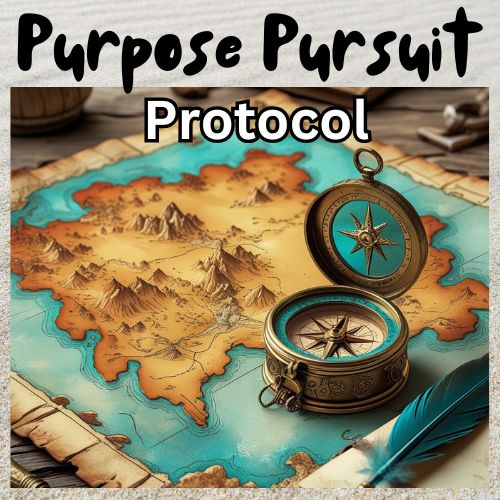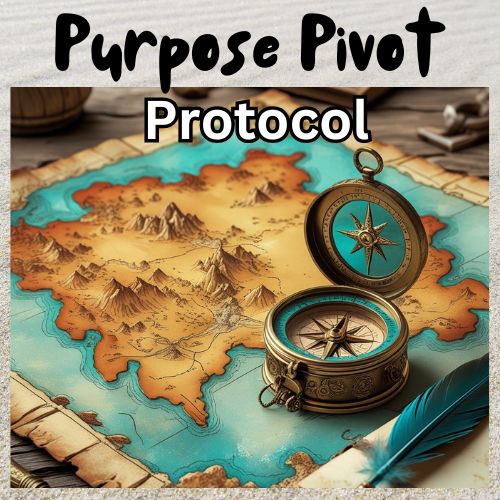Introducing a New Paradigm
As I find myself (no idea how it happened so fast) at the start of yet another decade, I’m thinking of creating a 10- year plan. As I have never done this before, not being a successful user of SMART goals, I find the whole idea fairly daunting.
Where do I even start?
As I skimmed through the lives of the role models I most admire, I discovered something I had not noticed before: none of them had set-in-stone 10-year plans either.
This revelation struck me again a week later, as I was talking to a TrailTracer retreat guest called Sarah, a tech executive who had just been promoted to Chief Innovation Officer at a Fortune 100 company. When I asked about her career strategy, expecting to hear about meticulous goal-setting and strategic planning, she just laughed.
“I’ve never had a traditional career plan,” she said. “Every major breakthrough in my life came from saying yes to something I could never even have imagined wanting.”
That sounded vaguely familiar. Getting much more than I could ever have imagined. Hmmm…
Sarah’s journey defies conventional wisdom. She started as a literature major, became a technical writer, transitioned into product management, led digital transformation initiatives, and now shapes innovation strategy for thousands of employees. Each transition seemed random, yet each built upon the last in ways that only became clear in retrospect.
Her story isn’t unique—it’s actually the norm among people who build remarkable futures.
Completely contradicting almost everything we’re taught about success.
The Planning Paradox
Walk into any bookstore’s self-help section, and you’ll find shelves devoted to goal-setting methodologies. SMART goals. Vision boards. Ten-year plans. The message is consistent: successful people know exactly where they’re going and methodically work backwards from their desired destination.
This narrative feels logical. After all, how can you hit a target you can’t see? How can you make progress without measuring against predetermined benchmarks? The planning approach appeals to our need for control and certainty in a seriously uncertain world.
But there’s a fundamental problem with this conventional wisdom: it assumes the future is predictable enough to plan for with precision.
Well, let me put you straight: it most certainly isn’t.
Consider the pace of change in the last decade alone. Make that the last three years, with the advent of AI. Entire industries have emerged that didn’t exist when today’s leaders were setting their “ten-year goals.” Social media management, app development, podcast production, drone operation, cryptocurrency trading—these weren’t career options you could plan for in 2014.
Whoever saw all that coming?
Even more telling is how established industries have transformed beyond recognition. Marketing professionals who rigidly stuck to their original expertise in print advertising found themselves obsolete, while those who remained curious and adaptable thrived in the digital revolution.
The ‘Open Options’ Advantage
The most successful future-builders operate from a different paradigm entirely. Instead of plotting precise destinations, they optimise for what venture capitalists call “optionality”—the ability to benefit from multiple possible futures without being locked into any single path.
Take the career of Jensen Huang, CEO of NVIDIA. His company’s massive success in artificial intelligence wasn’t the result of a master plan from 1993. NVIDIA initially focused on graphics cards for video games. But Huang and his team consistently made choices that expanded their technical capabilities and market possibilities. When AI emerged as a transformative force, NVIDIA’s existing expertise in parallel processing positioned them perfectly for the opportunity—not because they predicted it, but because they had built the capacity to seize it.
This pattern repeats across every domain of exceptional achievement. The musicians who build lasting careers aren’t those who rigidly pursue a single genre, but those who develop broad musical literacy and collaborative skills that create opportunities across multiple styles and mediums. The entrepreneurs who build enduring companies aren’t those who never deviate from their original business plan, but those who remain responsive to market feedback while building robust operational capabilities.
The Surprising Cost of Rigid Planning
Detailed long-term planning creates a subtle but significant cognitive trap: it encourages us to view deviations from our plan as failures rather than opportunities.
When we’re deeply committed to a specific future vision, we develop what psychologists call “confirmation bias on steroids.” We filter information to support our existing path while dismissing signals that might suggest better alternatives. We persist with strategies that are no longer optimal because changing course feels like admitting failure.
This rigidity becomes particularly dangerous during periods of rapid change. The executive who spent years building expertise in traditional retail may struggle to embrace e-commerce opportunities because it requires abandoning their established identity and starting over in an unfamiliar domain.
Meanwhile, those who maintain what Zen Buddhism calls “beginner’s mind” remain open to possibilities that others can’t even see. They treat their current path as one option among many, rather than a sacred commitment that must be defended at all costs.
Building Adaptive Capacity
If precise planning isn’t the answer, what is? The most effective approach involves building what we might call “adaptive capacity”—a combination of skills, relationships, and mindsets that enable you to thrive across a wide range of possible futures.
This means developing what researchers call “transferable capabilities” rather than narrow specialisations. A software engineer who also understands user psychology, business strategy, and team dynamics has far more career optionality than one who focuses exclusively on coding. A teacher who develops skills in curriculum design, educational technology, and organisational leadership can adapt to changes in the education landscape that would devastate someone with purely classroom-focused expertise.
Relationships matter just as much as skills. The most successful future-builders create diverse networks that span industries, generations, and perspectives. These relationships don’t just provide opportunities—they provide early signals about emerging trends and changing conditions. The marketing executive who maintains friendships with engineers, artists, and social workers has access to insights that someone within a purely marketing bubble would miss entirely.
Perhaps most importantly, adaptive capacity requires cultivating what philosopher John Dewey called “intelligent inquiry”—the ability to continuously update your understanding based on new evidence rather than defending existing beliefs. This means treating your current situation as an experiment rather than a destination, and remaining genuinely curious about alternatives you haven’t considered.
Understanding your life purpose serves as a crucial compass in this adaptive approach. When you’re clear about your core values and the impact you want to make in the world, you can evaluate opportunities through this lens without being constrained by specific career labels or predetermined paths. A person whose purpose centres on “helping others unlock their potential” might find fulfilment as a teacher, coach, manager, writer, or entrepreneur—the specific vehicle matters less than the underlying direction. This purpose-driven flexibility allows you to pivot between different expressions of your values while maintaining coherence and motivation across various life transitions.
Having a purpose is of such primordial importance to me, that I have created two “Define Your Life Purpose” Mentoring Programs: The Purpuse Pursuit Protocol is for you if you are still searching for your life purpose, and the Purpose Pivot Protocol – perfect if you have a life purpose that needs adjusting.
The Portfolio Approach to Life
The most sophisticated future-builders think like venture capitalists managing a portfolio of investments. They don’t put all their resources into a single bet, no matter how confident they feel about its prospects. Instead, they maintain multiple “positions” across different domains of their life.
This might mean developing expertise in both technical and creative fields, maintaining relationships across different industries, or pursuing projects that serve different values and interests. The key is ensuring that these various pursuits complement rather than compete with each other, creating what systems theorists call “positive feedback loops.”
A product manager who also writes fiction isn’t just hedging their bets—they’re developing complementary skills in storytelling, audience psychology, and creative problem-solving that make them more effective in both domains. A consultant who volunteers with environmental organisations isn’t just giving back—they’re building expertise in sustainability that increasingly influences business strategy across all sectors.
This portfolio approach provides resilience against unexpected changes while creating opportunities for breakthrough insights that emerge from combining different domains of knowledge.
Recognising Emerging Patterns
One of the most valuable skills for building adaptive capacity is learning to recognise emerging patterns before they become obvious to everyone else. This isn’t about predicting the future—it’s about developing sensitivity to early signals of change.
The entrepreneurs who built successful social media companies in the early 2000s weren’t necessarily more prescient than their peers. But they were paying attention to changes in internet infrastructure, user behaviour, and social connectivity that suggested new possibilities. They positioned themselves to benefit from trends they could sense but not precisely predict.
This pattern recognition develops through what cognitive scientists call “peripheral vision”—maintaining awareness of developments outside your immediate focus area. The accountant who notices emerging trends in automation, the teacher who tracks changes in communication technology, the manager who observes shifts in generational values—these individuals are building the contextual awareness that enables adaptive response.
Active Patience
Perhaps the most counterintuitive aspect of the optionality approach is that it requires a different relationship with time. Instead of rushing toward predetermined goals, successful future-builders practice what might be called ” patienceactive”—the willingness to invest in capabilities and relationships whose value may not be immediately apparent.
This means saying yes to opportunities that develop your skills or expand your network, even when they don’t obviously advance your current objectives. It means treating “lateral” moves as potentially more valuable than hierarchical advancement if they broaden your perspective and capabilities. It means viewing periods of uncertainty not as problems to be solved quickly, but as opportunities to explore possibilities that wouldn’t be available during more stable times.
The executive who takes an international assignment that doesn’t advance their immediate career trajectory may discover global perspectives that become invaluable as their industry becomes increasingly international. The consultant who volunteers to lead a cross-functional project may develop systems thinking skills that differentiate them as organisations become more complex and interconnected.
Creating Your Own Opportunities
What we often attribute to luck is frequently the result of positioning ourselves at the intersection of preparation and opportunity. But this positioning requires a fundamentally different approach than traditional goal-setting suggests.
Instead of trying to predict which specific opportunities will emerge, effective future-builders focus on developing the general capabilities and relationships that enable them to recognise and seize valuable opportunities when they appear. They invest in learning, networking, and experimentation not because they know exactly how these investments will pay off, but because they understand that maintaining optionality is more valuable than betting everything on a single predetermined outcome.
This approach requires both humility and confidence—humility about our ability to predict the future accurately, and confidence in our ability to adapt and thrive regardless of which future emerges.
Beyond the False Choice
The “options open” approach doesn’t mean abandoning all planning or direction. Rather, it means distinguishing between planning that increases your adaptive capacity and planning that constrains it.
Effective future-builders do set goals, but they hold them lightly. They make plans, but they treat them as hypotheses to be tested rather than commitments to be defended. They develop expertise, but they remain curious about adjacent domains that might become relevant.
Most importantly, they understand that building the future you want isn’t about controlling outcomes—it’s about developing the capacity to create value and find fulfilment across a wide range of possible outcomes.
The question isn’t whether you should plan for the future. The question is whether your planning approach makes you more or less capable of thriving in the most awesome of futures you can imagine.
Perhaps it’s time to reconsider what successful future-building actually looks like. Instead of asking “What do I want to be doing in ten years?” maybe the better question is “What capabilities, relationships, and perspectives do I want to develop that will serve me well regardless of how the world changes?”
The future you want might not be the future you can currently envision. Something better than you could ever have imagined might pop up if you keep your options open.

The Purpose Pursuit Protocol – if you want to discover your life purpose, this course will provide you with the clarity, motivation and direction you need to manifest your next chapter – in both your personal and professional life. Get immediate access

The Purpose Pivot Protocol – drawing inspiration from the Camino de Santiago, this transformative course guides you through a proven framework to recalibrate your authentic purpose and create a meaningful and fulfilling next act. Get immediate access

If your soul is craving fresh air, meaningful movement, and a chance to reconnect with nature, join us on a Camino de Santiago Crossroads Retreat in the southwest of France. This isn’t just a scenic hike – it’s a powerful, natural reboot for your body, mind, and spirit. Imagine quiet paths, rolling hills, cozy evenings, and slow conversations. No fitness requirements. No forced bonding. No pressure to have a breakthrough. Just one foot in front of the other, and a journey that meets you exactly where you are.

“I am an experienced medical doctor – MBChB, MRCGP, NLP master pract cert, Transformational Life Coach (dip.) Life Story Coach (cert.) Stress Counselling (cert.) Med Hypnotherapy (dip.) and EAGALA (cert.) I may have an impressive number of letters after my name, and more than three decades of professional experience, but what qualifies me to excel at what I do is my intuitive understanding of my clients’ difficulties and my extensive personal experience of managing major life changes using strategies I developed over many years.” Dr M Montagu

